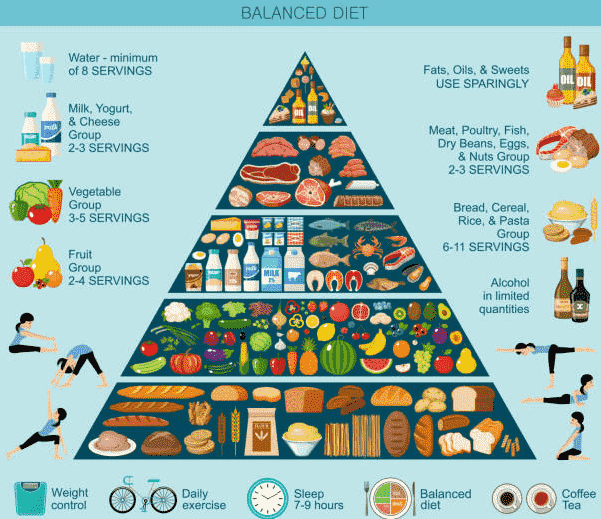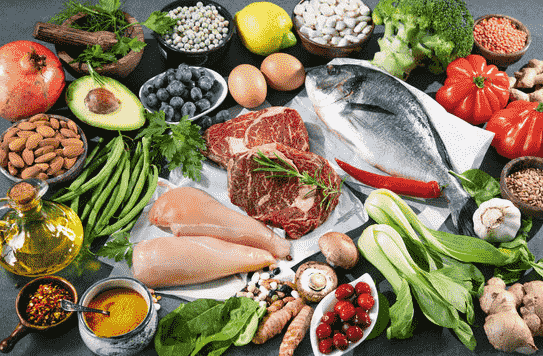For a healthy lifestyle, the importance of a balanced diet is immense. One can attain a healthy lifestyle only by keeping up a balanced diet and allowing for meeting all the essential nutrients needed by the body. The dietary requirements of a person vary as they pass through different stages of life, from infants to the elderly. To remain active and healthy, one must take into consideration the added exigencies set upon the body due to these changes with a balanced diet for every age group. An appropriate meal plan helps us achieve ideal body weight and lower the risk of chronic diseases such as diabetes, cardiovascular disorders, and cancer.
What is a Balanced Diet?

What precisely is a balanced diet? In plain words, it is a diet that gives the essential nutrients to help your body work perfectly. The importance of diet stays with the consumption of the right number of calories. Besides, your body gets hold of proper nutrition when you eat a broad range of food abundant in nutrients, for example, fresh fruit and vegetables, proteins, and whole grains.
Importance of a Balanced Diet
There is no doubt about the importance of a balanced diet in your life. If you do not keep up an appropriate diet for a healthy body, you will be susceptible to infection, diseases, and exhaustion. Especially, the significance of nutritious food for children should be emphasized as without it they may be inclined to numerous growth and developmental issues.
What Are The Ingredients of a Balanced Diet?

A balanced diet incorporates some particular healthy food groups. Normally, a balanced diet comprises 50-60% carbohydrates, 12-20% protein, and 30% fat. To get your body’s regular nutritional requirements, you should eat:
- Vegetables like leafy greens, legumes like beans and peas, starchy vegetables, red and orange vegetables, along with fresh whole fruits
- Whole grains such as quinoa, brown rice, barley, oats, and buckwheat
- Protein like fish, chicken, lean beef and pork, beans, peas, and legumes
- Dairy products like low-fat milk, cottage cheese, yogurt, and soy milk
A broad range of food choices should be made from each food group in specific amounts. These food resources from each food group offer a comparable amount of vital micro and macro-nutrients to meet the body’s needs.
Balanced Diet For Young Children
When a child starts eating solids, you should offer a broad variety of foods to make sure ample nutrition. Young children can be choosy but should be inspired to have a broad range of foods. You can make your child’s meals more palatable by incorporating nutrients in a visually attractive presentation.
During childhood, children have a tendency to impulsively change their food consumption to go with their growing patterns. Children’s diet requires to be different usually, depending on their development and their degree of physical activity. Similar to energy demands, a child’s requirements for protein, vitamins, and minerals augment with age.
The physical, social, and growth-related changes are fast during childhood. As the child is growing, they need protein and essential fatty acids that help develop the brain. When children go into adolescence, their food must be supplemented with crucial minerals like calcium, magnesium, phosphorus, and zinc that help in general development.
Balanced Diet For Teenagers
When children go into puberty, which happens for girls between the ages of 10 and 11 and boys in their early teens, they need proteins and nutrients like iron, and other minerals. Hence, this age group needs nutrient-dense meals, comprising wholegrain bread and cereals, fruits, nuts, vegetables, legumes, seafood, and lean meats.
Parents must include milk, cheese, and yogurt in a teenager’s diet to boost calcium absorption. This is particularly essential for growing bones. Teenage girls must be inspired to consume milk and milk products on a regular basis.
Balanced Diet For The 20-40 Age Group
Adult nutrition underlines the importance of eating wholesome food for a healthy body and keeping away from diseases. For males and females, the 20-40 age groups require different nutritional consumptions. Females in the family way demand additional iron, vitamins, and minerals in their meals.
Balance Diet For The 40-60 Age Group
The age of 40 is the ideal time to grasp the right balance. It is a time of transition, and nutritional requirements change as metabolism changes. Persons in this age group must make sure that they keep good health by incorporating strong antioxidants and phytonutrients in their diet, enhancing digestion, and strengthening their immune systems.
This age group is at hazard for osteoporosis, high blood pressure, heart disease, and mood swings owing to hormonal changes. Iron-rich foods such as nuts are tremendous supplies of healthy fatty acids like Omega 3. Berries, avocados, and green leafy vegetables also help ease early-onset symptoms.
Balance Diet For The Elderly (60 And Above)
The diet for older adults should be nutrient-dense because at this age a person’s body begins to weaken. Some elderly may not be able to cook their meals alone or may not be able to chew or swallow food well because of dental problems.
For the elderly, fish, eggs, liver, lean meats, low-fat dairy foods, legumes, nuts and seeds, fruit and vegetables, cereals, and whole grain bread are examples of nutrient-dense foods instead of energy-dense ones.
They must shun high-energy but low-in-nutrition foodstuffs such as sweet biscuits, cakes, and soft drinks. The elderly must eat fiber-rich food that stimulates gut health. Table salt should be used frugally.
You can also click on the button below for more information. Visit our blog and YouTube Channel for more details.
A balanced diet can increase immunity, combat illness-causing toxins, control weight, and lower the risk of high blood pressure, heart disease, stroke, bone loss, type-2 diabetes, and cancer. Accompanied by physical activity, a balanced diet can also support improved independence as you age.
Nutrients that become particularly significant as you age comprise protein, vitamin D, vitamin B12, and calcium. Older adults usually require fewer calories. However, their nutrient requirements are the same or even more compared to their younger age.
Adults older than 70 require more vitamin D and calcium to help keep up bone health than they did when they were younger. To meet these requirements, one should choose calcium-rich foods and drinks and try to get three servings of low-fat dairy products every day.



